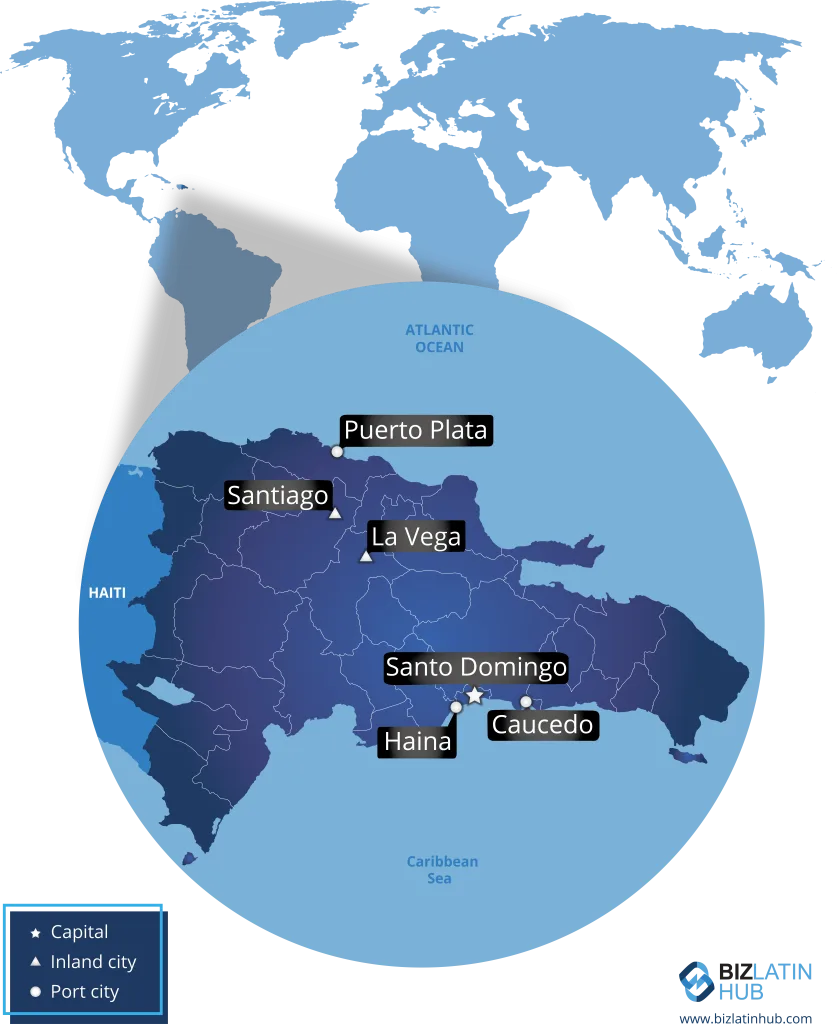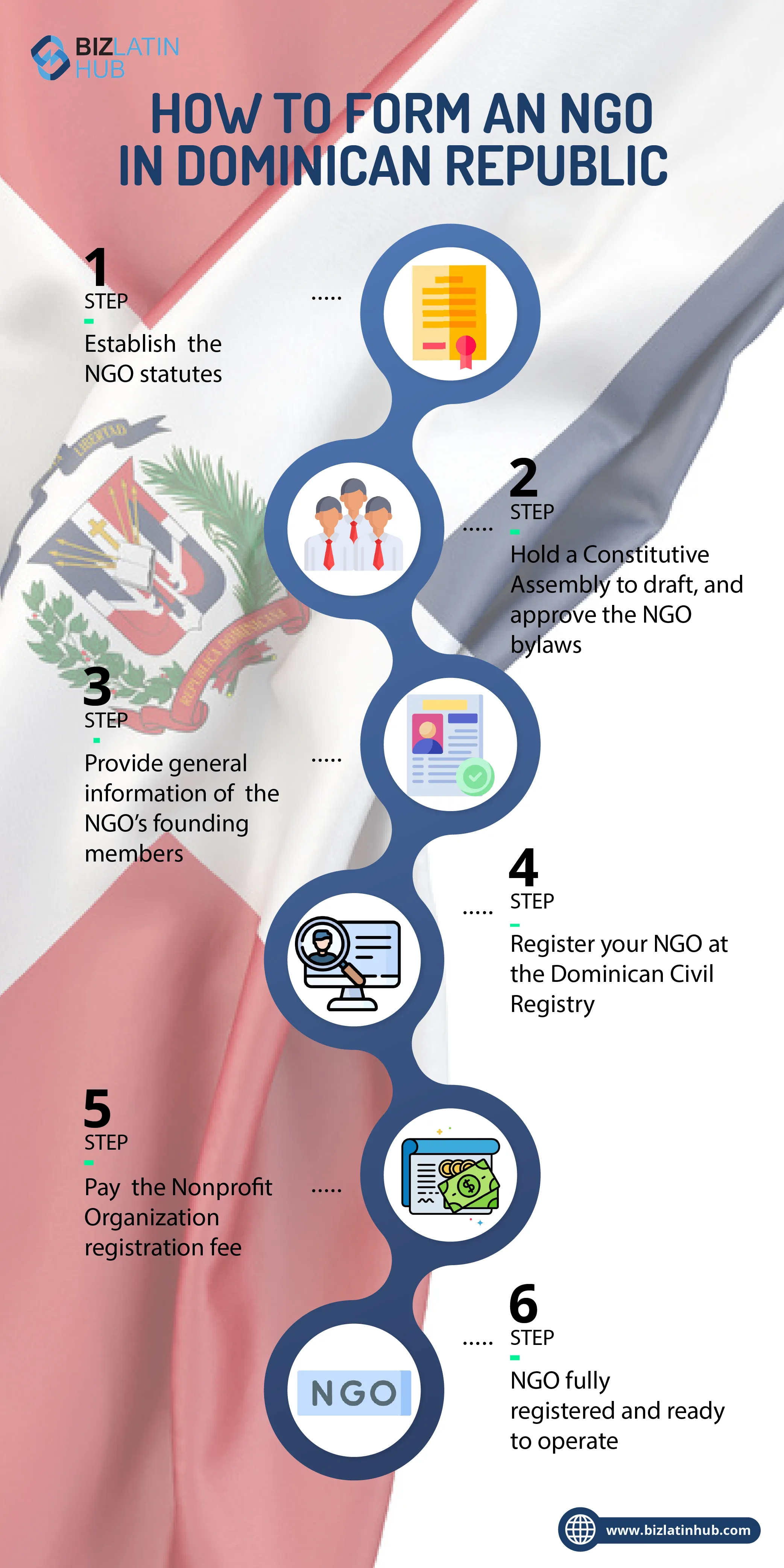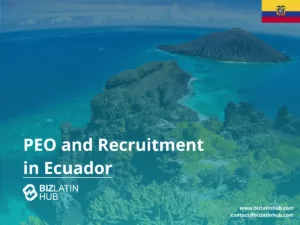If you are seeking to form a non-governmental organization (NGO) in the Dominican Republic, either to act as your organization’s base in the Caribbean or to focus exclusively on the island nation, you will want to understand the main steps and legal obligations associated with the process, as these might differ from the ones required during a process of company incorporation in the Dominican Republic. Because your not-for-profit organization will likely offer a social, cultural, or political service to the population, so you will want the process to go smoothly in order to get on with your good work as soon as possible.

The Dominican Republic is a famed tourist destination, thanks to its stunning weather and scenery, and the tourism and hospitality sector is a major source of jobs. In total, it accounts for an estimated 6.3% of gross domestic product (GDP), for which the country totaled $88.94 billion (all figures in USD) in 2019 — making it the largest economy in the Caribbean and eighth largest in Latin America.
The Dominican Republic is also a prosperous nation, highlighted by rising gross national income (GNI) over recent years, which reached $8,030 per capita in 2019 — a figure that places it as an upper-middle income country by standards established by the World Bank.
Other major economic sectors include agriculture and mining, which account for the country’s major export products, which include tobacco, cocoa, silver, nickel, coffee, gold, and sugar.
In terms of international commerce, the Dominican Republic is a party to a number of trade agreements, including bilateral investment treaties with multiple countries in Asia and Europe, and membership of the Central America – Dominican Republic Free Trade Agreement (CAFTA-DR), which provides preferential access to the United States, as well as to El Salvador, Costa Rica, Guatemala, Honduras, and Panama.
If you are interested in how to form an NGO in the Dominican Republic, read on to find out more about the reasons for doing so and the process involved. Or go ahead and reach out to us now for more information or a free quote.
Why form an NGO in the Dominican Republic?
While the cause your organization is focused on will be the basis of your motivation to form an NGO in the Dominican Republic, doing so also comes with a variety of other benefits. Because of the positive contribution that the NGO makes, both in terms of the jobs it creates and hardships it alleviates, working with an NGO will provide access to influential figures in the country, who will be keen to associate themselves with the work you are doing.
There are also financial incentives associated with maintaining an NGO, such as tax exemptions and opportunities to receive financial support from both the government and international organizations.
How to form an NGO in the Dominican Republic
The formation and management of NGOs in the Dominican Republic are governed by Law 122-05. To form an NGO in the Dominican Republic, you will need to undertake the following six steps:
1. Establish the statute of your NGO

The first step if you want to form an NGO in the Dominican Republic is to establish the organization’s statute. That is a legal document that outlines the mission and aims of the organization, as well as the conditions under which its volunteers, workers, and management will operate. When you are preparing the statute, you will need to establish an official name, and the country’s National Office of Industrial Property (ONAPI) will issue you with a single copy of the commercial name certificate for your organization.
Some other aspects to take into account when you are preparing the statute for your NGO include:
- Identify your partners and their obligations and rights
- Specify your corporate bodies
- Set your initial assets
- Specify disciplinary actions that the organization has recourse to
- Specify a date to close the financial year
- Provide information about how to liquidate and dismantle the NGO
2. Organize a constitutive assembly
Once you have established your statute, you will need to organize a constitutive assembly in order to form an NGO in the Dominican Republic. All of your partners must be present at this meeting, where they will sign the organizational bylaws, which must be in compliance with local laws.
3. Produce a copy of the minutes of the constitutive assembly
Once the assembly has been staged, a single original copy of the minutes of the meeting, including all of the agreements reached and details discussed, must be produced.
4. Retrieve the general information of the membership
When you register the NGO, you are going to need to provide the general information of its founding members, including their names, addresses, ID numbers. Note that these can be a passport or ID card number for a Dominican resident, but should be a passport number for a non-resident.
5. Register the NGO with the civil registry
With the statute established and bylaws signed, you are ready to register your NGO at the Dominican Civil Registry. Note that the documentation you present to official organizations will have to be in Spanish, so if the statute and any other documents were drawn up in English, they will need to be professionally translated.
Keep in mind that if your organization is linked to the Catholic Church, it will need to be formally authorized by the national ecclesiastical authority.
6. Pay the registration fee
As a final step to form an NGO in the Dominican Republic, you will have to pay an administrative charge, known as an “NPO registration fee,” which in 2021 stands at $44 (approximately $2,500 DOP). Once this payment has been received, you will receive confirmation of your registration, and your NGO will be legally allowed to operate.
Biz Latin Hub can help you form an NGO in the Dominican Republic
At Biz Latin Hub, our multilingual team of company formation specialists is ready to help you form an NGO in the Dominican Republic. With our complete portfolio of back-office support, including legal services, accounting and taxation support, commercial representation, and hiring and PEO, we can be a single point of contact to oversee your entry into the Dominican Republic, or any of the other 15 countries across Latin America and the Caribbean where we operate.
Reach out to us now for a free consultation or to discuss your options.
Or read about our team of expert authors here.






